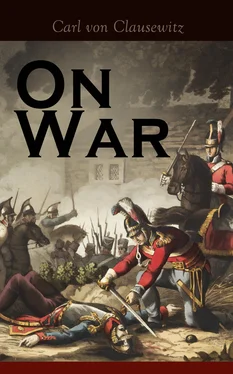Now, if we consider closely the use of historical proofs, four points of view readily present themselves for the purpose.
First, they may be used merely as an explanation of an idea. In every abstract consideration it is very easy to be misunderstood, or not to be intelligible at all: when an author is afraid of this, an exemplification from history serves to throw the light which is wanted on his idea, and to ensure his being intelligible to his reader.
Secondly, it may serve as an application of an idea, because by means of an example there is an opportunity of showing the action of those minor circumstances which cannot all be comprehended and explained in any general expression of an idea; for in that consists, indeed, the difference between theory and experience. Both these cases belong to examples properly speaking, the two following belong to historical proofs.
Thirdly, a historical fact may be referred to particularly, in order to support what one has advanced. This is in all cases sufficient, if we have only to prove the possibility of a fact or effect.
Lastly, in the fourth place, from the circumstantial detail of a historical event, and by collecting together several of them, we may deduce some theory, which therefore has its true proof in this testimony itself.
For the first of these purposes all that is generally required is a cursory notice of the case, as it is only used partially. Historical correctness is a secondary consideration; a case invented might also serve the purpose as well, only historical ones are always to be preferred, because they bring the idea which they illustrate nearer to practical life.
The second use supposes a more circumstantial relation of events, but historical authenticity is again of secondary importance, and in respect to this point the same is to be said as in the first case.
For the third purpose the mere quotation of an undoubted fact is generally sufficient. If it is asserted that fortified positions may fulfil their object under certain conditions, it is only necessary to mention the position of Bunzelwitz 13in support of the assertion.
But if, through the narrative of a case in history, an abstract truth is to be demonstrated, then everything in the case bearing on the demonstration must be analysed in the most searching and complete manner; it must, to a certain extent, develop itself carefully before the eyes of the reader. The less effectually this is done the weaker will be the proof, and the more necessary it will be to supply the demonstrative proof which is wanting in the single case by a number of cases, because we have a right to suppose that the more minute details which we are unable to give neutralise each other in their effects in a certain number of cases.
If we want to show by example derived from experience that cavalry are better placed behind than in a line with infantry; that it is very hazardous without a decided preponderance of numbers to attempt an enveloping movement, with widely separated columns, either on a field of battle or in the theatre of war—that is, either tactically or strategically—then in the first of these cases it would not be sufficient to specify some lost battles in which the cavalry was on the flanks and some gained in which the cavalry was in rear of the infantry; and in the tatter of these cases it is not sufficient to refer to the battles of Rivoli and Wagram, to the attack of the Austrians on the theatre of war in Italy, in 1796, or of the French upon the German theatre of war in the same year. The way in which these orders of battle or plans of attack essentially contributed to disastrous issues in those particular cases must be shown by closely tracing out circumstances and occurrences. Then it will appear how far such forms or measures are to be condemned, a point which it is very necessary to show, for a total condemnation would be inconsistent with truth.
It has been already said that when a circumstantial detail of facts is impossible, the demonstrative power which is deficient may to a certain extent be supplied by the number of cases quoted; but this is a very dangerous method of getting out of the difficulty, and one which has been much abused. Instead of one well-explained example, three or four are just touched upon, and thus a show is made of strong evidence. But there are matters where a whole dozen of cases brought forward would prove nothing, if, for instance, they are facts of frequent occurrence, and therefore a dozen other cases with an opposite result might just as easily be brought forward. If any one will instance a dozen lost battles in which the side beaten attacked in separate converging columns, we can instance a dozen that have been gained in which the same order was adopted. It is evident that in this way no result is to be obtained.
Upon carefully considering these different points, it will be seen how easily examples may be misapplied.
An occurrence which, instead of being carefully analysed in all its parts, is superficially noticed, is like an object seen at a great distance, presenting the same appearance on each side, and in which the details of its parts cannot be distinguished. Such examples have, in reality, served to support the most contradictory opinions. To some Daun’s campaigns are models of prudence and skill. To others, they are nothing but examples of timidity and want of resolution. Buonaparte’s passage across the Noric Alps in 1797 may be made to appear the noblest resolution, but also as an act of sheer temerity. His strategic defeat in 1812 may be represented as the consequence either of an excess, or of a deficiency, of energy. All these opinions have been broached, and it is easy to see that they might very well arise, because each person takes a different view of the connection of events. At the same time these antagonistic opinions cannot be reconciled with each other, and therefore one of the two must be wrong.
Much as we are obliged to the worthy Feuquieres for the numerous examples introduced in his memoirs—partly because a number of historical incidents have thus been preserved which might otherwise have been lost, and partly because he was one of the first to bring theoretical, that is, abstract, ideas into connection with the practical in war, in so far that the cases brought forward may be regarded as intended to exemplify and confirm what is theoretically asserted—yet, in the opinion of an impartial reader, he will hardly be allowed to have attained the object he proposed to himself, that of proving theoretical principles by historical examples. For although he sometimes relates occurrences with great minuteness, still he falls short very often of showing that the deductions drawn necessarily proceed from the inner relations of these events.
Another evil which comes from the superficial notice of historical events, is that some readers are either wholly ignorant of the events, or cannot call them to remembrance sufficiently to be able to grasp the author’s meaning, so that there is no alternative between either accepting blindly what is said, or remaining unconvinced.
It is extremely difficult to put together or unfold historical events before the eyes of a reader in such a way as is necessary, in order to be able to use them as proofs; for the writer very often wants the means, and can neither afford the time nor the requisite space; but we maintain that, when the object is to establish a new or doubtful opinion, one single example, thoroughly analysed, is far more instructive than ten which are superficially treated. The great mischief of these superficial representations is not that the writer puts his story forward as a proof when it has only a false title, but that he has not made himself properly acquainted with the subject, and that from this sort of slovenly, shallow treatment of history, a hundred false views and attempts at the construction of theories arise, which would never have made their appearance if the writer had looked upon it as his duty to deduce from the strict connection of events everything new which he brought to market, and sought to prove from history.
Читать дальше












